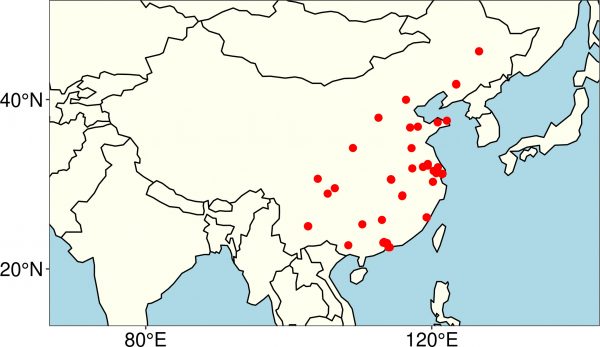For years, the Chinese authorities have boasted of the country’s growing organ transplant industry, which Beijing says will overtake that of the United States in the near future. However, government claims that all these organs are sourced from willing donors have faced skepticism for years, as human rights organizations assert that the majority come from innocent people murdered by the communist regime.
TOP PHOTO: Reports that organ harvesting was being used by the communist authorities in China as a means of killing first surfaced in 2006.
Chinese transplants violated the ‘dead donor rule,’ according to 71 papers published from 1980 to 2015
For years, the Chinese authorities have boasted of the country’s growing organ transplant industry, which Beijing says will overtake that of the United States in the near future. However, government claims that all these organs are sourced from willing donors have faced skepticism for years, as human rights organizations assert that the majority come from innocent people murdered by the communist regime.
A new study released on April 4 by the American Journal of Transplantation sheds further light on the allegations, which, if true, would mean potentially hundreds of thousands of people murdered by surgeons in Chinese hospitals.
According to the report, titled Execution by organ procurement: Breaching the dead donor rule in China, much of the publicly available data from China suggests that many donors were not brain dead when their organs were harvested.
“Our algorithm searched for evidence of problematic declarations of brain death during organ procurement. We find evidence in 71 of these reports, spread nationwide, that brain death could not have properly been declared,” write authors Matthew P. Robertson and Jacob Lavee, long-time investigators of the organ harvesting allegations.
This would be both a violation of basic transplantation ethics, and at the same time show that the donors died not from accidents — as is the case in the U.S. — but due to their organs being surgically removed.
“In these cases, the removal of the heart during organ procurement must have been the proximate cause of the donor’s death,” Robertson and Lavee write in the study’s abstract. The findings, they say, “strongly suggest that physicians in the People’s Republic of China have participated in executions by organ removal.”
No confirmation of brain death before surgery
Reports that organ harvesting was being used by the communist authorities in China as a means of killing first surfaced in 2006. The allegations focused on the millions of Falun Gong practitioners — a community whose faith was banned by the Chinese Communist Party (CCP) in 1999 — as the likely victims of this crime.
Initial work by activists such as Canadian lawyer David Matas and David Kilgour, the retired Canadian cabinet minister who passed away on April 6 at the age of 81, established how mass murder of prisoners for their organs could be taking place in the PRC.
The “Two Davids” and others noted that the Chinese transplant industry had taken off only following the mass arrests and detention of Falun Gong adherents, a pool of people numbering in the tens of millions. In 2019, an independent court in the UK, the China Tribunal, judged that unwilling Falun Gong practitioners were,“beyond a reasonable doubt,” the principal source of China’s organ transplants.
Robertson and Lavee’s most recent study is centered on “a forensic review of 2838 papers drawn from a dataset of 124 770 Chinese-language transplant publications.”
In order for a transplant to be ethically conducted, the donor must be “brain dead,” or unable to breathe without the aid of a ventilator.
However, among the 2838 papers, 71 contained evidence that Chinese transplant doctors were declaring the donors “brain dead” without the proper tests, which take hours.
The papers were published between 1980 and 2015 by professionals at 56 hospitals in multiple Chinese provinces, suggesting that such practices are widespread throughout the country.

Lavee, who is director of the Heart Transplantation Unit at the Sheba Medical Center in Israel, told The Epoch Times that the report is the first to uncover a true “smoking gun” that proves Chinese doctors have been executing people via organ removal.
Robertson, an Australian doctoral student and China studies fellow at the Victims of Communism Memorial Foundation, noted that such evidence disappeared after 2015, adding that “they [the CCP] keep an eye on what dissidents are saying, especially on this issue, which is very sensitive,” he said.
Burying the evidence “would just take an email or some phone calls,” he told The Epoch Times.
Where does China get its organs?
Due to cultural emphasis on burying or cremating the dead with their bodies whole, Chinese are reluctant to sign up as voluntary donors for organ transplants, and the PRC’s first organ donation system was only introduced in 2015.
After the allegations of organ harvesting from Falun Gong practitioners emerged, Beijing admitted to the practice, but claimed that only death-row prisoners were subject to having their organs removed.
The CCP treats Falun Gong as a third-rail issue, referring to the group as an “evil cult.” State propaganda has ostracized and dehumanized adherents of the traditional spiritual faith in the nearly 23 years since the beginning of the anti-Falun Gong campaign.
Much of the existing research into organ harvesting implicates high-ranking officials in the CCP, including figures such as former head of China’s police and courts Zhou Yongkang, and former Politburo member Bo Xilai.
Zhou was a head of the 610 Office, a CCP organization tasked with coordinating and overseeing the persecution of Falun Gong, while Bo’s leadership roles in Northeast China saw him and his wife Gu Kailai come into close association with questionable practices such as a plastination factory in Dalian that processed human cadavers provided by the police for display in the “Body Worlds” exhibits.
The bodies, which include that of a heavily pregnant woman, are of unknown origin but suspected of being sourced from murdered Falun Gong practitioners. Investigative journalist Ethan Gutmann, author of the 2014 book The Slaughter: Mass Killings, Organ Harvesting, and China’s Secret Solution to Its Dissident Problem, has suggested that tens of thousands of Falun Gong adherents, underground Christians, and more recently, Uyghur Muslims could be victims of organ harvesting every year.
In 2015, the head of China’s transplant sector, Huang Jiefu, credited the authorities with providing organs donated from death-row convicts.
“We are deeply grateful to the many cadres in the judicial system, because without their cooperation, without organs donated from death row prisoners, China’s transplantation system would not be as technologically advanced and mature as it is today,” he said.
And though Huang claimed that the prisoners were executed by the judicial organs and that doctors only removed the organs, Robertson and Lavee say that their “research suggests otherwise.”
“If the reports we examine are accurate, they indicate that heart and lung procurement by the surgeon was the proximate cause of the prisoner’s death, thus directly implicating the surgeon in the execution,” the report reads.
This article reprinted from the Vision Times.



